Trauma
Trauma
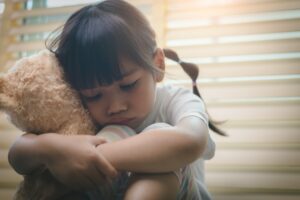



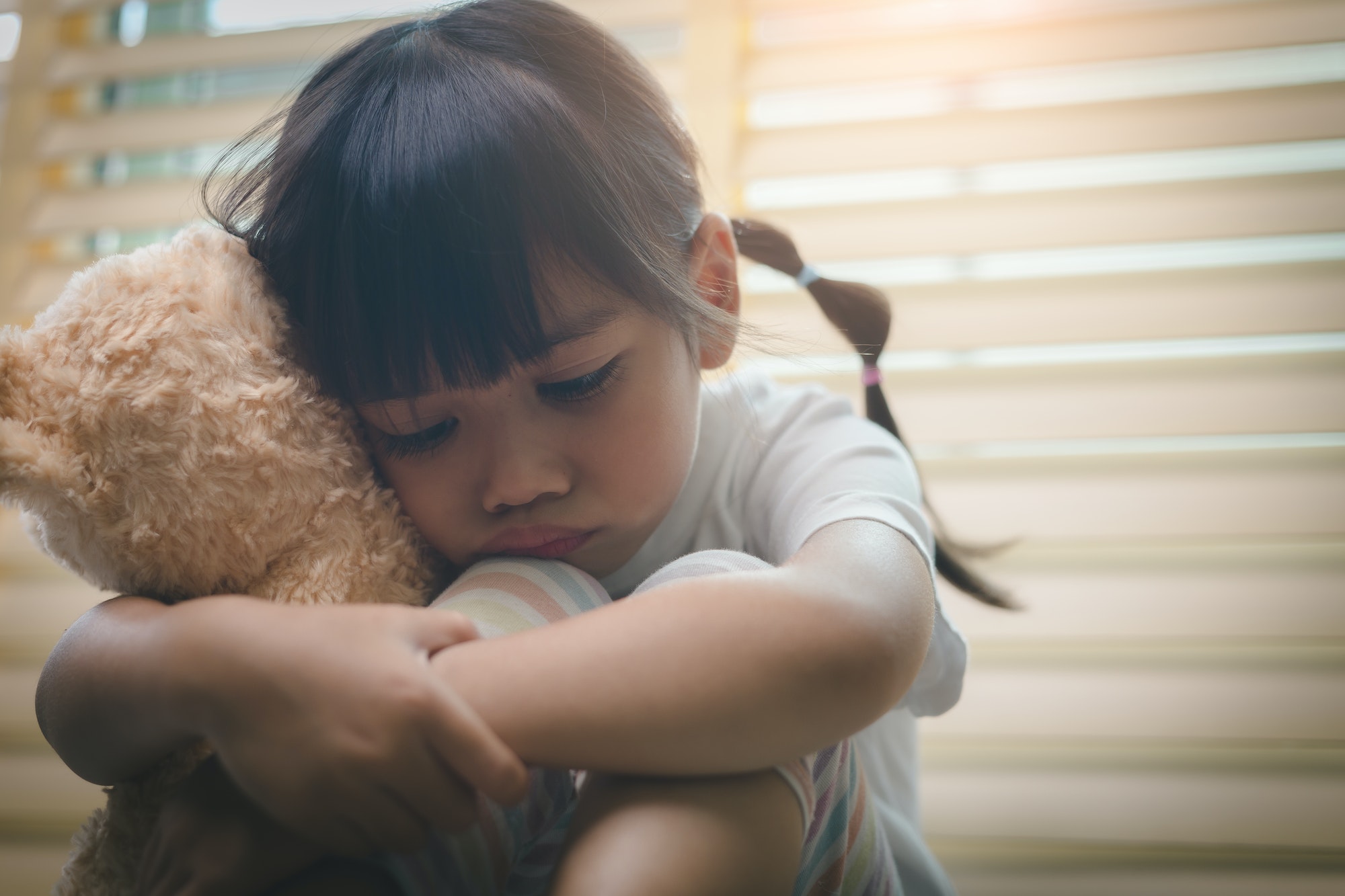
Childhood trauma can be caused by community violence. This is not just contained to dangerous areas, it can happen anywhere. Community violence can happen to anyone in any place. These acts can create a lasting impact on anyone involved, even bystanders. They frequently cause PTSD and many other mental issues. Unfortunately, these evens happen every day. Anyone that has been a victim of community violence runs the risk of feeling unsafe in their neighborhood, home, school or work which can impact every part of their lives. With the help of family, friends, and/or a professional many people are able to work through their trauma over time and get back to living their lives.

Trauma can happen to anyone for many different reasons, some even suffer from multiple traumas before they are an adult. There are also several types of traumas that are out of anyone’s control such as natural disasters, accidents, illness or death. There are several things that a loved one can do to help a child that has recently been involved in a traumatic event. Make sure that the child understands that they are safe, explain that they are not responsible for the event, be patient with them and the speed they are willing to work on things and lastly, seek the help of a professional if you feel it is necessary. Remember that having a good support system can make the difference to a child that is scared or hurting. We all process and heal differently but being supportive is something everyone can benefit from.

Do you know or believe your child has been through a traumatic event? The signs can be scary and dangerous. Adolescents can cope with their emotions in negative ways when they do not know how to process their feelings. They can engage in risky behaviors to help avoid their feelings or to feel in control of their lives. They may also withdraw from their friends and family if they feel secluded or fall into depression. When a loved one notices these signs it is important to listen to their concerns and be as supportive as you can. If you feel that they need more help than you can give, you should reach out to a professional.

Trauma can affect many different aspects of a child’s life which can carry into adulthood. It can change the way our brains function. Repeated threats releases various chemicals into the body that can damage the brain and its development. This can cause issues with cognition and processes information. It should be no surprise that it can also alter the behavior and emotional response of children. They may change these and not even notice. Relationships are also impacted when someone suffers from trauma. Children can become fearful and untrusting depending on the trauma they have endured. Trauma also has consequences for the economy. More help is needed for these individuals whether it be social services, healthcare, criminal justice systems and law enforcement, no name a few. These impacts can be mild or serve depending on the person and the event that took place. No matter what, it takes time and work to overcome these negative effects on a person. The first step in correcting them is to understand that it can be better. We can always change our lives for the better.
Most of us have had some form of trauma in our lives, and it often occurs before we are considered adults. Some children do not have any adverse effects from their experiences while others do. This can be difficult, especially when we are not old enough to process what is happening. If left untreated, it can cause problems for the rest of our lives, affecting many different aspects. The good news is that we are able to work through our traumatic experiences and overcome them. The most important part of recovery is that the child has a supportive, understanding and caring support system. If you believe that it would beneficial for your child to seek professional help reach out to trusted people in your life and ask for referrals.
Childhood trauma can be caused by community violence. This is not just contained to dangerous areas, it can happen anywhere. Community violence can happen to anyone in any place. These acts can create a lasting impact on anyone involved, even bystanders. They frequently cause PTSD and many other mental issues. Unfortunately, these evens happen every day. Anyone that has been a victim of community violence runs the risk of feeling unsafe in their neighborhood, home, school or work which can impact every part of their lives. With the help of family, friends, and/or a professional many people are able to work through their trauma over time and get back to living their lives.

Trauma can happen to anyone for many different reasons, some even suffer from multiple traumas before they are an adult. There are also several types of traumas that are out of anyone’s control such as natural disasters, accidents, illness or death. There are several things that a loved one can do to help a child that has recently been involved in a traumatic event. Make sure that the child understands that they are safe, explain that they are not responsible for the event, be patient with them and the speed they are willing to work on things and lastly, seek the help of a professional if you feel it is necessary. Remember that having a good support system can make the difference to a child that is scared or hurting. We all process and heal differently but being supportive is something everyone can benefit from.

Do you know or believe your child has been through a traumatic event? The signs can be scary and dangerous. Adolescents can cope with their emotions in negative ways when they do not know how to process their feelings. They can engage in risky behaviors to help avoid their feelings or to feel in control of their lives. They may also withdraw from their friends and family if they feel secluded or fall into depression. When a loved one notices these signs it is important to listen to their concerns and be as supportive as you can. If you feel that they need more help than you can give, please reach out to a professional.

Trauma can affect many different aspects of a child’s life which can carry into adulthood. It can change the way our brains function. Repeated threats releases various chemicals into the body that can damage the brain and its development. This can cause issues with cognition and processes information. It should be no surprise that it can also alter the behavior and emotional response of children. They may change these and not even notice. Relationships are also impacted when someone suffers from trauma. Children can become fearful and untrusting depending on the trauma they have endured. Trauma also has consequences for the economy. More help is needed for these individuals whether it be social services, healthcare, criminal justice systems and law enforcement, no name a few. These impacts can be mild or serve depending on the person and the event that took place. No matter what, it takes time and work to overcome these negative effects on a person. The first step in correcting them is to understand that it can be better. We can always change our lives for the better.
Most of us have had some form of trauma in our lives, and it often occurs before we are considered adults. Some children do not have any adverse effects from their experiences while others do. This can be difficult, especially when we are not old enough to process what is happening. If left untreated, it can cause problems for the rest of our lives, affecting many different aspects. The good news is that we are able to work through our traumatic experiences and overcome them. The most important part of recovery is that the child has a supportive, understanding and caring support system. If you believe that it would beneficial for your child to seek professional help reach out to trusted people in your life and ask for referrals.
Family Conflicts & Stressors
Family Conflicts & Stressors
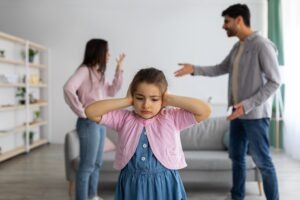
Family conflict is one of the biggest stressors in adolescents lives. In most cases, this is completely normal and will decrease as children grow older. However, it can put a strain on children and parents while they are in the midst of it. In addition, prolonged or severe stress can alter the way a child’s brain develops and can cause damage that will last a lifetime.
No matter how well the family functions, all families have conflict. People living together with different personalities will have differences in opinion and this only increases when children enter adolescents. No matter the ages of those living in the household, there are ways to help reduce the amount of issues a family has and decrease negative feelings each person might have. When your family is experiencing conflict make sure that you sit down and discuss the issues each member is having. Everyone should be given a chance to speak, no one should feel or be attacked for their thoughts or feelings and the goal should be to fix the issue(s), not winning an argument. If you feel your family could benefit from talking to a professional, reach out to someone you trust to recommend a therapist or do some searching for someone that will fit your families needs.

We crave a connection with our family members but it can be difficult to navigate. The stronger the family bond, the easier it is to overcome disagreements and quarrels. Whether you love the family you were born into or the family you choose, it is important to have them around you for love, encouragement and even conflict.

Family conflict will always occur, but there are ways to decrease these occurrences. Having open lines of communication between family members can help alleviate issues that will arise. Family meetings are a great way for everyone to discuss their thoughts and feelings without feeling attacked. This gives members the ability to speak with each other when they are calm and are not on the defense. Also having boundaries and clear consequences will keep adolescents from guessing about their expectations and what may happen if they make a mistake. Allowing family members to be themselves and accepting that there will be disagreements between members. On the other side, having routines, traditions and sharing hobbies will bring all members closer which will make disagreements easier to handle.
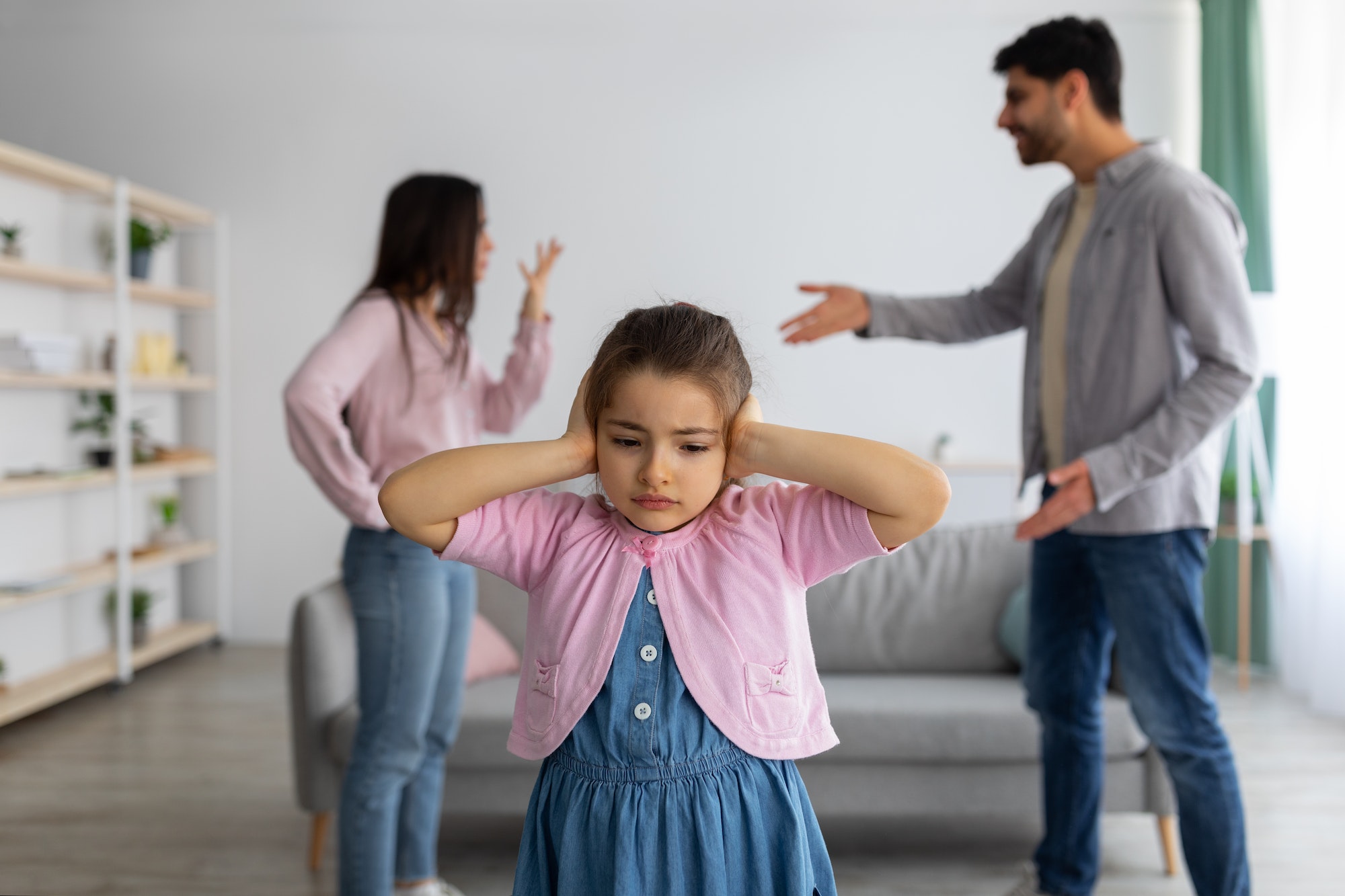
Family conflict is one of the biggest stressors in adolescents lives. In most cases, this is completely normal and will decrease as children grow older. However, it can put a strain on children and parents while they are in the midst of it. In addition, prolonged or severe stress can alter the way a child’s brain develops and can cause damage that will last a lifetime.
No matter how well the family functions, all families have conflict. People living together with different personalities will have differences in opinion and this only increases when children enter adolescents. No matter the ages of those living in the household, there are ways to help reduce the amount of issues a family has and decrease negative feelings each person might have. When your family is experiencing conflict make sure that you sit down and discuss the issues each member is having. Everyone should be given a chance to speak, no one should feel or be attacked for their thoughts or feelings and the goal should be to fix the issue(s), not winning an argument. If you feel your family could benefit from talking to a professional, reach out to someone you trust to recommend a therapist or do some searching for someone that will fit your families needs.

We crave a connection with our family members but it can be difficult to navigate. The stronger the family bond, the easier it is to overcome disagreements and quarrels. Whether you love the family you were born into or the family you choose, it is important to have them around you for love, encouragement and even conflict.

Family conflict will always occur, but there are ways to decrease these occurrences. Having open lines of communication between family members can help alleviate issues that will arise. Family meetings are a great way for everyone to discuss their thoughts and feelings without feeling attacked. This gives members the ability to speak with each other when they are calm and are not on the defense. Also having boundaries and clear consequences will keep adolescents from guessing about their expectations and what may happen if they make a mistake. Allowing family members to be themselves and accepting that there will be disagreements between members. On the other side, having routines, traditions and sharing hobbies will bring all members closer which will make disagreements easier to handle.
School Anxiety

If your child is struggling with back to school anxiety, there are a few things you can do to help ease their thoughts. Including them in the process will help them to transition while allowing them to expect what their expectations are. If they are ok with you speaking to someone at the school this can give you an inside person that can help their experience easier. A school counselor, teacher or administrator can be a support system for your student. One of the best things you can do to help anxiety is set a routine. This will help eliminate any morning surprises before you get to school. Lastly, researching coping skills to help your child throughout the day so that they can help ease their anxiety which will allow them to focus on other parts of their lives. If you or your child feels that they need more then you may need to reach out to a mental health professional.

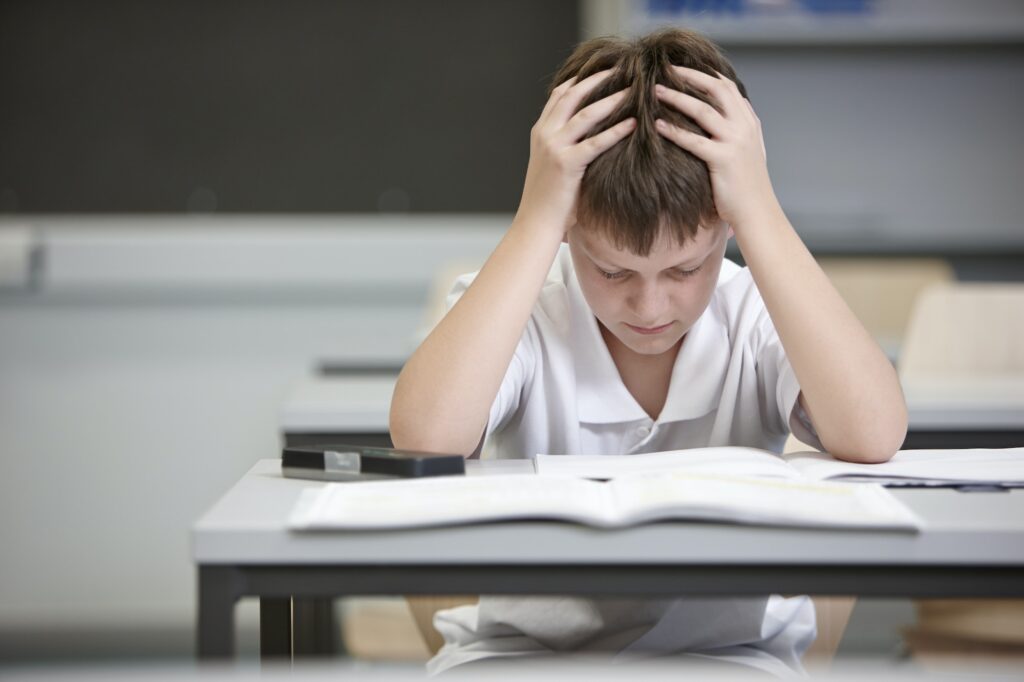
School has started back and you may be noticing increased signs of stress in your student. Some of this is normal stress that is good for your child to experience and learn to handle; however, many students are struggling to adjust to being back at school so it might be too much for them to handle alone. If your child is exhibiting any of the signs listed, we encourage you to speak with them and see why they are struggling. If necessary, seek help from a professional.
There are a few coping skills your child can implement if they’re experiencing school anxiety which may help ease their anxiety. It is beneficial for them to find strategies they can implement at home and at school. If you believe your child may need a break during class, we encourage you to contact your student’s teachers and/or school counselor and let them know. Most teachers will be happy to allow a 5-10 minute break and if necessary, counselors will allow student to take a break in their office. If you need further information or help with your child’s school anxiety please feel free to reach out to Anchor Counseling FTW, we would love to help!

In some cases, adolescents will resort to negative coping behaviors when they do not know what else to do. These can be mild, like withdrawing or isolating themselves or they can be more severe and dangerous, like self harm or substance/alcohol abuse.
If you believe that your child is using these coping mechanisms it is important that you discuss it with your child immediately. We know this can be difficult to discuss with them but these behaviors rarely resolves themselves on their own.
You may also want to reach out to a medical professional and/or a mental health professional to work on replacing these negative coping skills with positive ones.
School Anxiety

If your child is struggling with back to school anxiety, there are a few things you can do to help ease their thoughts. Including them in the process will help them to transition while allowing them to expect what their expectations are. If they are ok with you speaking to someone at the school this can give you an inside person that can help their experience easier. A school counselor, teacher or administrator can be a support system for your student. One of the best things you can do to help anxiety is set a routine. This will help eliminate any morning surprises before you get to school. Lastly, researching coping skills to help your child throughout the day so that they can help ease their anxiety which will allow them to focus on other parts of their lives. If you or your child feels that they need more then you may need to reach out to a mental health professional.

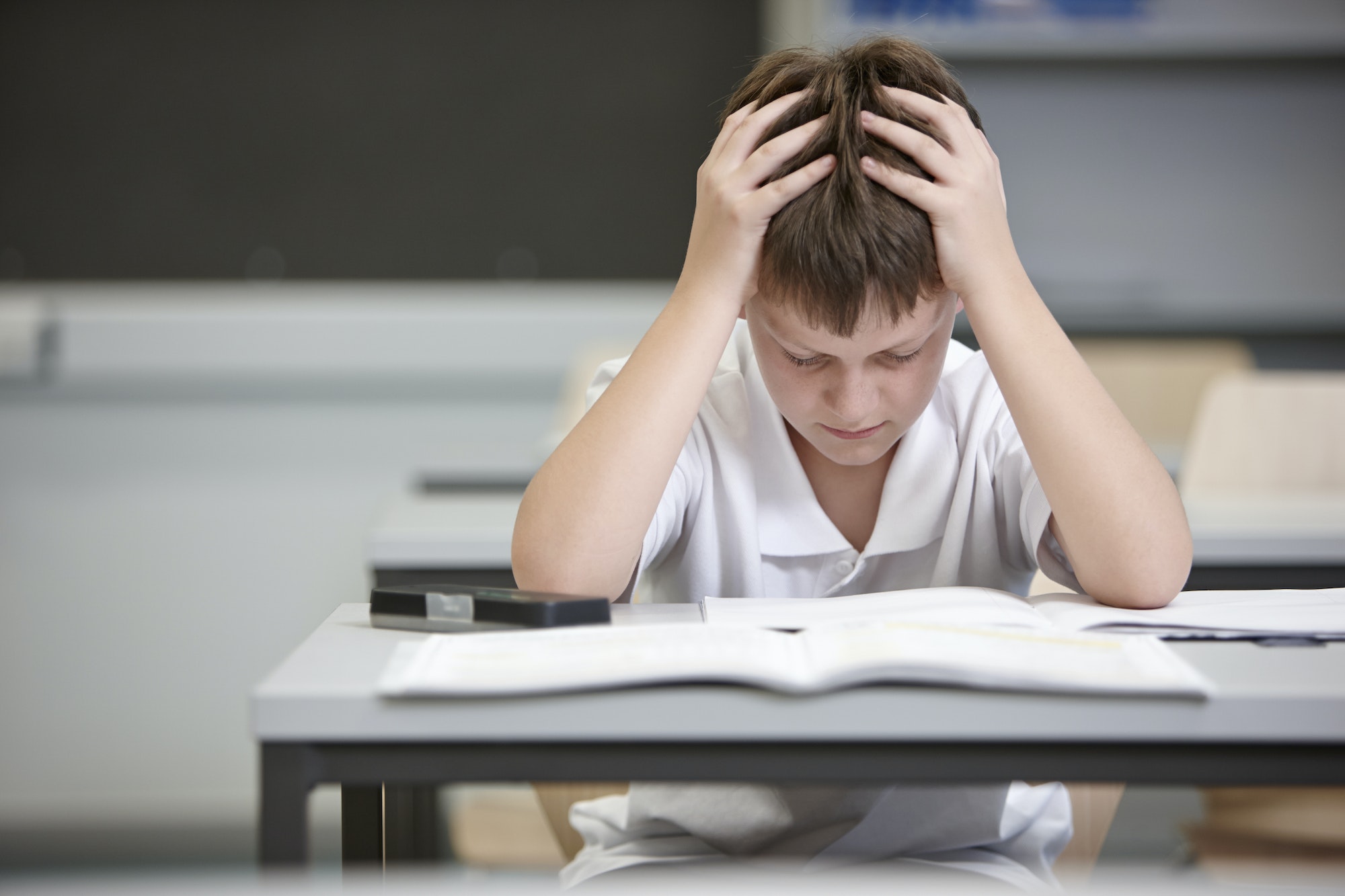
School has started back and you may be noticing increased signs of stress in your student. Some of this is normal stress that is good for your child to experience and learn to handle; however, many students are struggling to adjust to being back at school so it might be too much for them to handle alone. If your child is exhibiting any of the signs listed, we encourage you to speak with them and see why they are struggling. If necessary, seek help from a professional.
There are a few coping skills your child can implement if they’re experiencing school anxiety, which may help ease their anxiety. It is beneficial for them to find strategies they can implement at home and at school. If you believe your child may need a break during class, we encourage you to contact your student’s teachers and/or school counselor and let them know. Most teachers will be happy to allow a 5-10 minute break and if necessary, counselors will allow the student to take a break in their office. If you need further information or help with your child’s school anxiety, please feel free to reach out to Anchor Counseling FTW – we would love to help!

In some cases, adolescents will resort to negative coping behaviors when they do not know what else to do. These can be mild, like withdrawing or isolating themselves or they can be more severe and dangerous, like self harm or substance/alcohol abuse. If you believe that your child is using these coping mechanisms it is important that you discuss it with your child immediately. We know this can be difficult to discuss with them but these behaviors rarely resolves themselves on their own.
You may also want to reach out to a medical professional and/or a mental health professional to work on replacing these negative coping skills with positive ones.
Bullying
Bullying
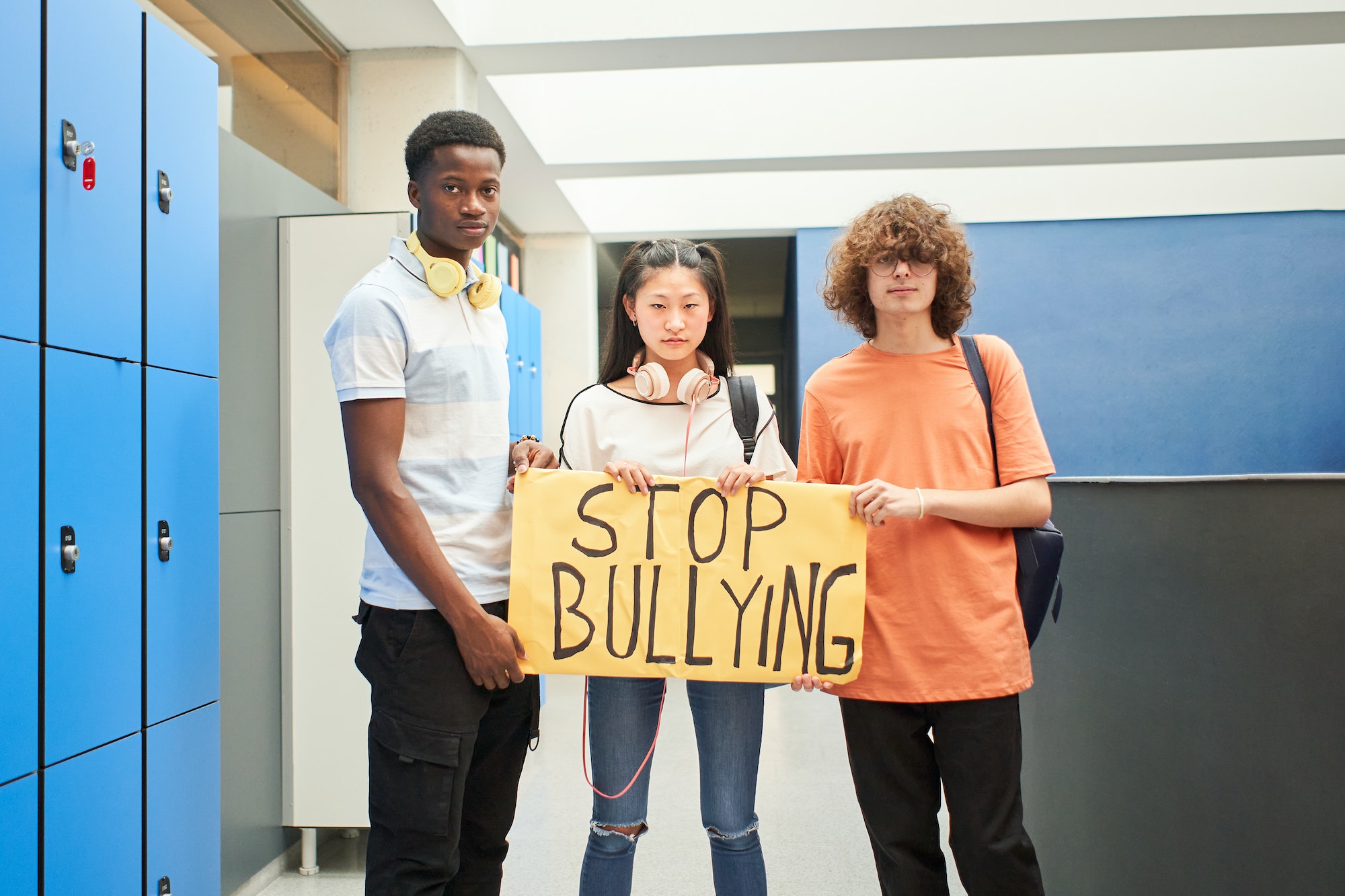
Bullying can cause a person to exhibit negative emotions and feelings. These are a few issues that might arise if your child is being bullied, or is even a bystander of someone else getting bullied. You may be wondering if there is anything your child can do to help prevent bullying. Speak to them about talking to the child that is doing the bullying and asking them to stop. This gives the child a chance to correct their behavior and teaches both kids how to solve conflict appropriately. Also let your child know that they should not encourage the person who is bullying by laughing or giving them any kind of positive reinforcement. This only fuels the child who is doing the bullying because he/she has an audience. If your child tries to end the bullying but is unsuccessful they should tell a trusted adult to help or take over the situation.

If your child has any of these symptoms, try talking to them about what is making them feel this way. Most of these symptoms can be from many different mental health issues so it is important that you speak with your child and figure out what is bothering them. As always, seek professional help if it is something that you and your family cannot handle on their own.
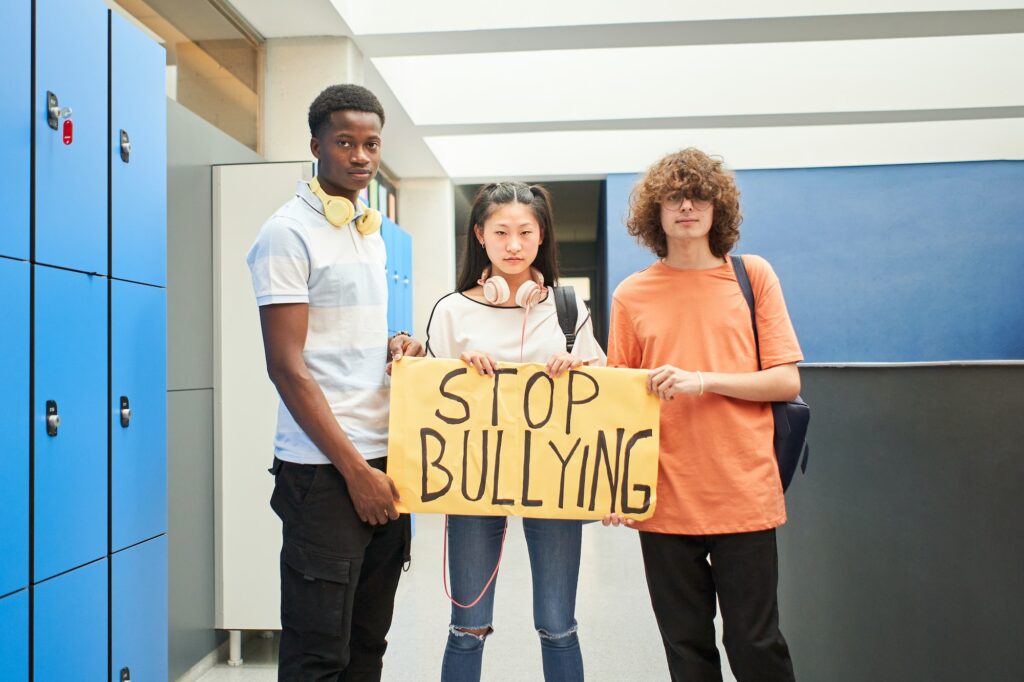

There are many ways someone can get bullied. It can be virtual, verbal or virtual. These actions are on purpose and repetitive. Bullying can cause trauma which can have long lasting effects. Ideally we would like to prevent bullying from happening but this is not always possible. Giving your child the tools that they need to protect themselves and others is beneficial.
There are many ways someone can get bullied. It can be virtual, verbal or virtual. These actions are on purpose and repetitive. Bullying can cause trauma which can have long lasting effects. Ideally we would like to prevent bullying from happening but this is not always possible. Giving your child the tools that they need to protect themselves and others is beneficial.
So what is bullying? Bullying is a deliberate and unsolicited action that occurs with the intent of inflicting social, emotional, physical, and/or psychological harm to someone who often is perceived as being less powerful.
You may be curious if there is anything your child can do to help prevent bullying. We recommend speaking to them about talking to the child doing the bullying and asking them to stop. This gives the child a chance to correct their behavior and teaches both kids how to solve conflict appropriately. Also let your child know they should not encourage the person who is bullying by laughing or giving them any kind of positive reinforcement. This only fuels the child who is doing the bullying because he/she has an audience. If your child tries to end the bullying but is unsuccessful, they should ask a trusted adult to help or take over the situation.
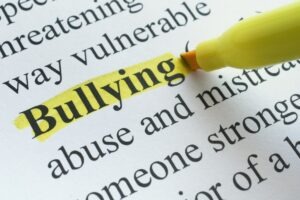
Bullying can cause a person to exhibit negative emotions and feelings. These are a few issues that might arise if your child is being bullied, or is even a bystander of someone else getting bullied. You may be wondering if there is anything your child can do to help prevent bullying. Speak to them about talking to the child that is doing the bullying and asking them to stop. This gives the child a chance to correct their behavior and teaches both kids how to solve conflict appropriately. Also let your child know that they should not encourage the person who is bullying by laughing or giving them any kind of positive reinforcement. This only fuels the child who is doing the bullying because he/she has an audience. If your child tries to end the bullying but is unsuccessful they should tell a trusted adult to help or take over the situation.

If your child has any of these symptoms, try talking to them about what is making them feel this way. Most of these symptoms can be from many different mental health issues so it is important that you speak with your child and figure out what is bothering them. As always, seek professional help if it is something that you and your family cannot handle on their own.

There are many ways someone can get bullied. It can be virtual, verbal or virtual. These actions are on purpose and repetitive. Bullying can cause trauma which can have long lasting effects. Ideally we would like to prevent bullying from happening but this is not always possible. Giving your child the tools that they need to protect themselves and others is beneficial.
So what is bullying? Bullying is a deliberate and unsolicited action that occurs with the intent of inflicting social, emotional, physical, and/or psychological harm to someone who often is perceived as being less powerful. You may be curious if there is anything your child can do to help prevent bullying. We recommend speaking to them about talking to the child doing the bullying and asking them to stop. This gives the child a chance to correct their behavior and teaches both kids how to solve conflict appropriately. Also let your child know they should not encourage the person who is bullying by laughing or giving them any kind of positive reinforcement. This only fuels the child who is doing the bullying because he/she has an audience. If your child tries to end the bullying but is unsuccessful, they should ask a trusted adult to help or take over the situation.
Violence
Violence
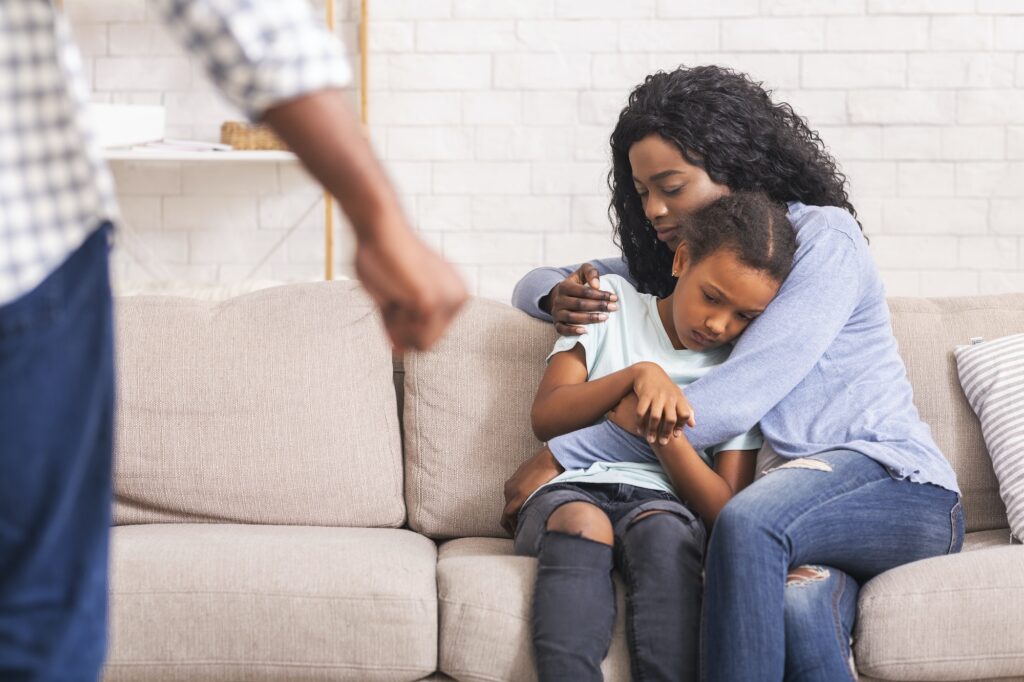

Violence harms everyone in society and takes a toll on those in the community. Unfortunately, violence has been a part of the world since the beginning. Continue to be a caring, kind and positive influence in your world and make it a better place.
You might be wondering if there is a way to avoid community violence. In some cases there is no way to avoid it but there are steps you can take to lessen your chances of being a victim of violence.
You can make sure that you are aware of what is going on around you and if possible, do not go places alone. When you do go out you can identify the exits to the building so you will know where to go in case of an emergency. When walking or running you should try to avoid taking the same route all the time so that others cannot predict where you will be at certain times. Lastly, know the people in your life that you can count on if you are in trouble.
These are not guaranteed to keep you from a bad situation but it can help you stay safe by not putting yourself in dangerous situations.

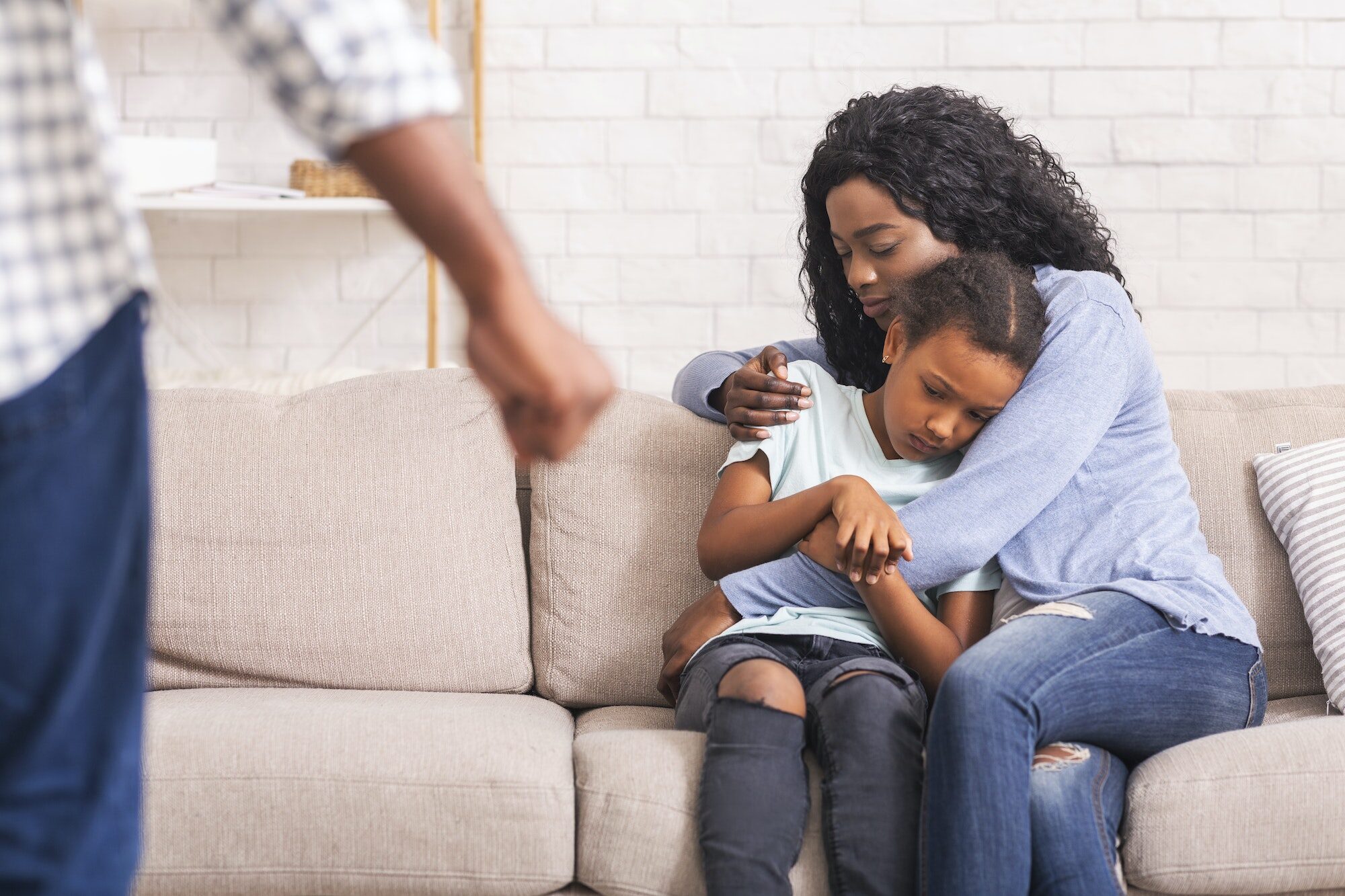

Violence harms everyone in society and takes a toll on those in the community. Unfortunately, violence has been a part of the world since the beginning. Continue to be a caring, kind and positive influence in your world and make it a better place. You might be curious if there is a way to avoid community violence. In some cases there is no way to avoid it but there are steps you can take to lessen your chances of being a victim of violence.
You can make sure that you are aware of what is going on around you and if possible, do not go places alone. When you do go out you can identify the exits to the building so you will know where to go in case of an emergency. When walking or running you should try to avoid taking the same route all the time so that others cannot predict where you will be at certain times. Lastly, know the people in your life that you can count on if you are in trouble. These are not guaranteed to keep you from a bad situation but it can help you stay safe by not putting yourself in dangerous situations.

When someone is exposed to violence, they often have trouble getting back to their normal lives. They could experience many different effects which can be temporary or long term depending on the person and the support they get after the event.
No matter what the person feels or expresses they will need supportive people around them to give them a sense of safety.


